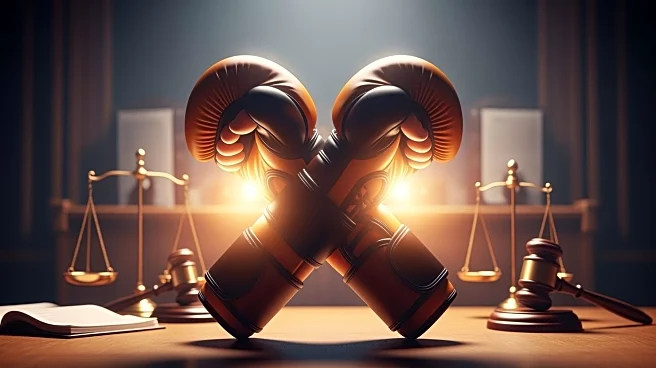What's Happening?
Jorge Masvidal, a veteran UFC fighter, has been awarded a default judgment of over $5 million against Fanmio, the promoter of his 2024 boxing match against Nate Diaz. The judgment was signed by Judge Beatrice
Butchko Sanchez after an arbitrator ruled in favor of Masvidal, who claimed he was not fully compensated for the fight. Masvidal had agreed to a purse of $6 million, with a potential increase to $7 million if he won. Despite losing the match, Masvidal alleged he received only $1 million plus a $150,000 advance. The arbitrator awarded Masvidal $5,315,268.64, including compensatory damages and attorney fees. Fanmio is also facing a separate lawsuit from Nate Diaz, who claims he is owed $10 million for the same fight.
Why It's Important?
The judgment against Fanmio highlights significant issues within the sports promotion industry, particularly concerning contractual obligations and payment disputes. This case underscores the importance of transparency and accountability in financial dealings between athletes and promoters. The ruling may influence future contracts and negotiations, ensuring athletes are adequately compensated for their participation in high-profile events. Additionally, the legal challenges faced by Fanmio could impact its reputation and operations, potentially affecting its ability to secure future events and partnerships.
What's Next?
With the judgment in favor of Masvidal, Fanmio is expected to fulfill the payment obligations as ordered by the court. The company may face further legal scrutiny as Nate Diaz's lawsuit progresses, potentially leading to additional financial penalties. The outcomes of these cases could prompt other athletes to reassess their agreements with promoters, seeking more secure and transparent contractual terms. Fanmio's response to these legal challenges will be closely watched by industry stakeholders, including other promoters and athletes.
Beyond the Headlines
The legal battles involving Fanmio and high-profile athletes like Masvidal and Diaz may lead to broader discussions about the ethics and practices within sports promotion. The industry may see increased calls for regulatory oversight to protect athletes' rights and ensure fair compensation. This case could also influence cultural perceptions of athlete-promoter relationships, emphasizing the need for mutual respect and equitable treatment.









